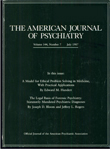Eating disorders in males: a report on 135 patients
Abstract
OBJECTIVE: The goal of this study was to better understand the etiology, clinical characteristics, and prognosis of eating disorders in males. METHOD: All males with eating disorders who had been treated at Massachusetts General Hospital from Jan. 1, 1980, to Dec. 31, 1994, were identified. Hospital charts and psychiatric departmental records were reviewed to verify that the eating disorders met DSM-IV criteria and to abstract demographic and clinical data. RESULTS: One hundred thirty-five males with eating disorders were identified, of whom 62 (46%) were bulimic, 30 (22%) were anorexic, and 43 (32%) met criteria for an eating disorder not otherwise specified. There were marked differences in sexual orientation by diagnostic group; 42% of the male bulimic patients were identified as either homosexual or bisexual, and 58% of the anorexic patients were identified as asexual. Comorbid psychiatric disorders were common, particularly major depressive disorder (54% of all patients), substance abuse (37%), and personality disorder (26%). Many patients had a family history of affective disorder (29%) or alcoholism (37%). CONCLUSIONS: While most characteristics of males and females with eating disorders are similar, homosexuality/bisexuality appears to be a specific risk factor for males, especially for those who develop bulimia nervosa. Future research on the link between sexual orientation and eating disorders would help guide prevention and treatment strategies.



